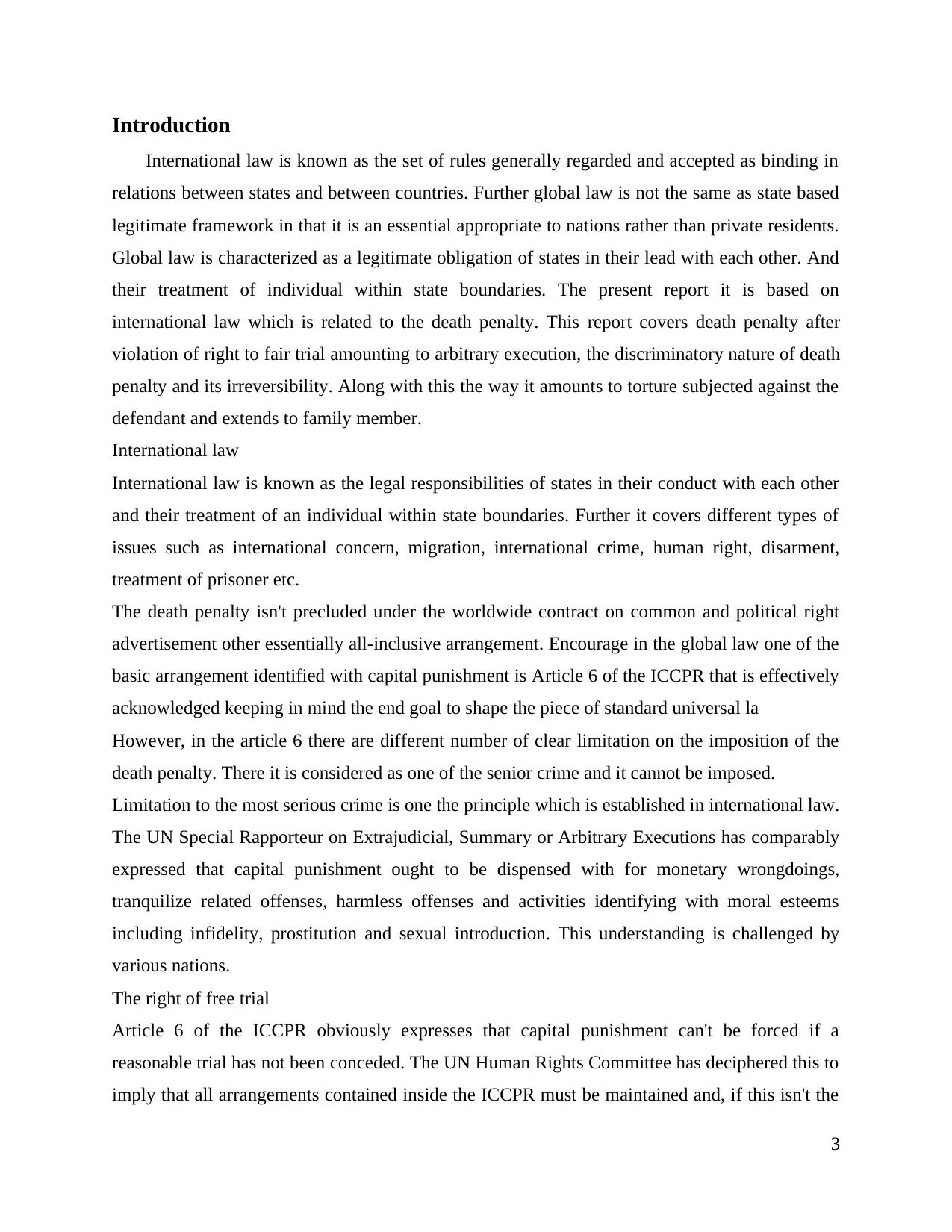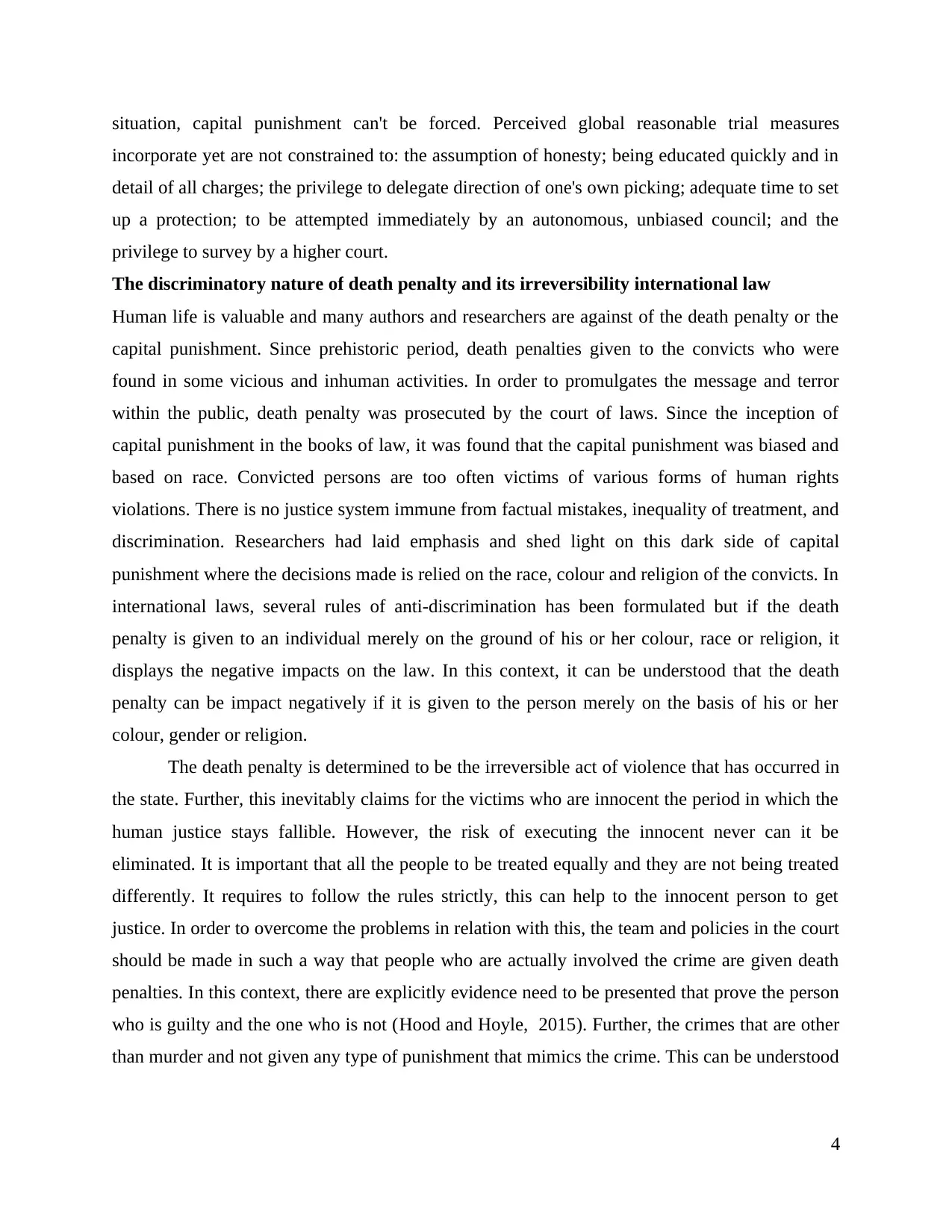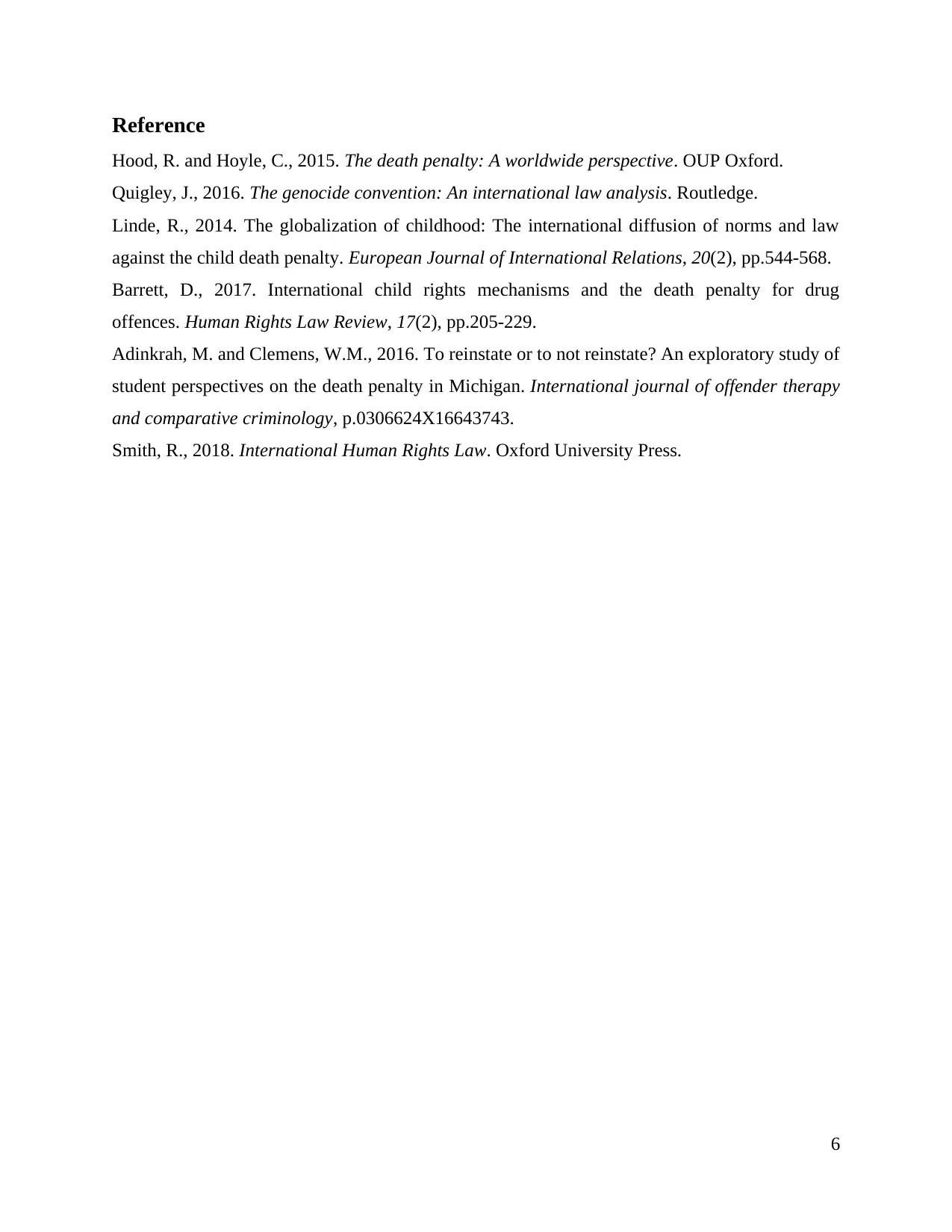International Law: Death Penalty, Human Rights, and Justice
VerifiedAdded on 2020/06/06
|6
|1128
|58
Report
AI Summary
This report delves into the realm of international law concerning the death penalty, examining its implications in the context of human rights and justice. It meticulously analyzes the legal responsibilities of states, particularly focusing on the limitations and restrictions on the imposition of capital punishment. The report highlights the significance of Article 6 of the ICCPR, emphasizing the limitations on imposing death penalty and the importance of fair trial guarantees. It also discusses the discriminatory nature of the death penalty and its irreversible consequences, emphasizing the risk of executing innocent individuals and the need for equal treatment under the law. Furthermore, the report considers the issue of arbitrary executions and the potential for torture, not only for the defendant but also for their family members, providing a comprehensive overview of the legal and ethical considerations surrounding capital punishment within the framework of international law.

International law
1
1
Paraphrase This Document
Need a fresh take? Get an instant paraphrase of this document with our AI Paraphraser

Table of Contents
Introduction......................................................................................................................................3
Reference.........................................................................................................................................6
2
Introduction......................................................................................................................................3
Reference.........................................................................................................................................6
2

Introduction
International law is known as the set of rules generally regarded and accepted as binding in
relations between states and between countries. Further global law is not the same as state based
legitimate framework in that it is an essential appropriate to nations rather than private residents.
Global law is characterized as a legitimate obligation of states in their lead with each other. And
their treatment of individual within state boundaries. The present report it is based on
international law which is related to the death penalty. This report covers death penalty after
violation of right to fair trial amounting to arbitrary execution, the discriminatory nature of death
penalty and its irreversibility. Along with this the way it amounts to torture subjected against the
defendant and extends to family member.
International law
International law is known as the legal responsibilities of states in their conduct with each other
and their treatment of an individual within state boundaries. Further it covers different types of
issues such as international concern, migration, international crime, human right, disarment,
treatment of prisoner etc.
The death penalty isn't precluded under the worldwide contract on common and political right
advertisement other essentially all-inclusive arrangement. Encourage in the global law one of the
basic arrangement identified with capital punishment is Article 6 of the ICCPR that is effectively
acknowledged keeping in mind the end goal to shape the piece of standard universal la
However, in the article 6 there are different number of clear limitation on the imposition of the
death penalty. There it is considered as one of the senior crime and it cannot be imposed.
Limitation to the most serious crime is one the principle which is established in international law.
The UN Special Rapporteur on Extrajudicial, Summary or Arbitrary Executions has comparably
expressed that capital punishment ought to be dispensed with for monetary wrongdoings,
tranquilize related offenses, harmless offenses and activities identifying with moral esteems
including infidelity, prostitution and sexual introduction. This understanding is challenged by
various nations.
The right of free trial
Article 6 of the ICCPR obviously expresses that capital punishment can't be forced if a
reasonable trial has not been conceded. The UN Human Rights Committee has deciphered this to
imply that all arrangements contained inside the ICCPR must be maintained and, if this isn't the
3
International law is known as the set of rules generally regarded and accepted as binding in
relations between states and between countries. Further global law is not the same as state based
legitimate framework in that it is an essential appropriate to nations rather than private residents.
Global law is characterized as a legitimate obligation of states in their lead with each other. And
their treatment of individual within state boundaries. The present report it is based on
international law which is related to the death penalty. This report covers death penalty after
violation of right to fair trial amounting to arbitrary execution, the discriminatory nature of death
penalty and its irreversibility. Along with this the way it amounts to torture subjected against the
defendant and extends to family member.
International law
International law is known as the legal responsibilities of states in their conduct with each other
and their treatment of an individual within state boundaries. Further it covers different types of
issues such as international concern, migration, international crime, human right, disarment,
treatment of prisoner etc.
The death penalty isn't precluded under the worldwide contract on common and political right
advertisement other essentially all-inclusive arrangement. Encourage in the global law one of the
basic arrangement identified with capital punishment is Article 6 of the ICCPR that is effectively
acknowledged keeping in mind the end goal to shape the piece of standard universal la
However, in the article 6 there are different number of clear limitation on the imposition of the
death penalty. There it is considered as one of the senior crime and it cannot be imposed.
Limitation to the most serious crime is one the principle which is established in international law.
The UN Special Rapporteur on Extrajudicial, Summary or Arbitrary Executions has comparably
expressed that capital punishment ought to be dispensed with for monetary wrongdoings,
tranquilize related offenses, harmless offenses and activities identifying with moral esteems
including infidelity, prostitution and sexual introduction. This understanding is challenged by
various nations.
The right of free trial
Article 6 of the ICCPR obviously expresses that capital punishment can't be forced if a
reasonable trial has not been conceded. The UN Human Rights Committee has deciphered this to
imply that all arrangements contained inside the ICCPR must be maintained and, if this isn't the
3
⊘ This is a preview!⊘
Do you want full access?
Subscribe today to unlock all pages.

Trusted by 1+ million students worldwide

situation, capital punishment can't be forced. Perceived global reasonable trial measures
incorporate yet are not constrained to: the assumption of honesty; being educated quickly and in
detail of all charges; the privilege to delegate direction of one's own picking; adequate time to set
up a protection; to be attempted immediately by an autonomous, unbiased council; and the
privilege to survey by a higher court.
The discriminatory nature of death penalty and its irreversibility international law
Human life is valuable and many authors and researchers are against of the death penalty or the
capital punishment. Since prehistoric period, death penalties given to the convicts who were
found in some vicious and inhuman activities. In order to promulgates the message and terror
within the public, death penalty was prosecuted by the court of laws. Since the inception of
capital punishment in the books of law, it was found that the capital punishment was biased and
based on race. Convicted persons are too often victims of various forms of human rights
violations. There is no justice system immune from factual mistakes, inequality of treatment, and
discrimination. Researchers had laid emphasis and shed light on this dark side of capital
punishment where the decisions made is relied on the race, colour and religion of the convicts. In
international laws, several rules of anti-discrimination has been formulated but if the death
penalty is given to an individual merely on the ground of his or her colour, race or religion, it
displays the negative impacts on the law. In this context, it can be understood that the death
penalty can be impact negatively if it is given to the person merely on the basis of his or her
colour, gender or religion.
The death penalty is determined to be the irreversible act of violence that has occurred in
the state. Further, this inevitably claims for the victims who are innocent the period in which the
human justice stays fallible. However, the risk of executing the innocent never can it be
eliminated. It is important that all the people to be treated equally and they are not being treated
differently. It requires to follow the rules strictly, this can help to the innocent person to get
justice. In order to overcome the problems in relation with this, the team and policies in the court
should be made in such a way that people who are actually involved the crime are given death
penalties. In this context, there are explicitly evidence need to be presented that prove the person
who is guilty and the one who is not (Hood and Hoyle, 2015). Further, the crimes that are other
than murder and not given any type of punishment that mimics the crime. This can be understood
4
incorporate yet are not constrained to: the assumption of honesty; being educated quickly and in
detail of all charges; the privilege to delegate direction of one's own picking; adequate time to set
up a protection; to be attempted immediately by an autonomous, unbiased council; and the
privilege to survey by a higher court.
The discriminatory nature of death penalty and its irreversibility international law
Human life is valuable and many authors and researchers are against of the death penalty or the
capital punishment. Since prehistoric period, death penalties given to the convicts who were
found in some vicious and inhuman activities. In order to promulgates the message and terror
within the public, death penalty was prosecuted by the court of laws. Since the inception of
capital punishment in the books of law, it was found that the capital punishment was biased and
based on race. Convicted persons are too often victims of various forms of human rights
violations. There is no justice system immune from factual mistakes, inequality of treatment, and
discrimination. Researchers had laid emphasis and shed light on this dark side of capital
punishment where the decisions made is relied on the race, colour and religion of the convicts. In
international laws, several rules of anti-discrimination has been formulated but if the death
penalty is given to an individual merely on the ground of his or her colour, race or religion, it
displays the negative impacts on the law. In this context, it can be understood that the death
penalty can be impact negatively if it is given to the person merely on the basis of his or her
colour, gender or religion.
The death penalty is determined to be the irreversible act of violence that has occurred in
the state. Further, this inevitably claims for the victims who are innocent the period in which the
human justice stays fallible. However, the risk of executing the innocent never can it be
eliminated. It is important that all the people to be treated equally and they are not being treated
differently. It requires to follow the rules strictly, this can help to the innocent person to get
justice. In order to overcome the problems in relation with this, the team and policies in the court
should be made in such a way that people who are actually involved the crime are given death
penalties. In this context, there are explicitly evidence need to be presented that prove the person
who is guilty and the one who is not (Hood and Hoyle, 2015). Further, the crimes that are other
than murder and not given any type of punishment that mimics the crime. This can be understood
4
Paraphrase This Document
Need a fresh take? Get an instant paraphrase of this document with our AI Paraphraser

with the help of example, rapists are not punished by sexual assault and the people who are
found guilty of assault are not ceremonially beaten for the crimes that are done by them.
5
found guilty of assault are not ceremonially beaten for the crimes that are done by them.
5

Reference
Hood, R. and Hoyle, C., 2015. The death penalty: A worldwide perspective. OUP Oxford.
Quigley, J., 2016. The genocide convention: An international law analysis. Routledge.
Linde, R., 2014. The globalization of childhood: The international diffusion of norms and law
against the child death penalty. European Journal of International Relations, 20(2), pp.544-568.
Barrett, D., 2017. International child rights mechanisms and the death penalty for drug
offences. Human Rights Law Review, 17(2), pp.205-229.
Adinkrah, M. and Clemens, W.M., 2016. To reinstate or to not reinstate? An exploratory study of
student perspectives on the death penalty in Michigan. International journal of offender therapy
and comparative criminology, p.0306624X16643743.
Smith, R., 2018. International Human Rights Law. Oxford University Press.
6
Hood, R. and Hoyle, C., 2015. The death penalty: A worldwide perspective. OUP Oxford.
Quigley, J., 2016. The genocide convention: An international law analysis. Routledge.
Linde, R., 2014. The globalization of childhood: The international diffusion of norms and law
against the child death penalty. European Journal of International Relations, 20(2), pp.544-568.
Barrett, D., 2017. International child rights mechanisms and the death penalty for drug
offences. Human Rights Law Review, 17(2), pp.205-229.
Adinkrah, M. and Clemens, W.M., 2016. To reinstate or to not reinstate? An exploratory study of
student perspectives on the death penalty in Michigan. International journal of offender therapy
and comparative criminology, p.0306624X16643743.
Smith, R., 2018. International Human Rights Law. Oxford University Press.
6
⊘ This is a preview!⊘
Do you want full access?
Subscribe today to unlock all pages.

Trusted by 1+ million students worldwide
1 out of 6
Your All-in-One AI-Powered Toolkit for Academic Success.
+13062052269
info@desklib.com
Available 24*7 on WhatsApp / Email
![[object Object]](/_next/static/media/star-bottom.7253800d.svg)
Unlock your academic potential
Copyright © 2020–2026 A2Z Services. All Rights Reserved. Developed and managed by ZUCOL.

